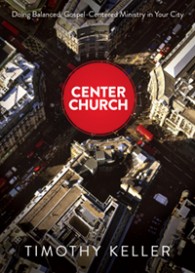Rethinking gospel ministry for a secular age…

How do you build a thriving church in one of the most secular metropolitan centers of the world, New York City? Does it require programs and techniques that appeal to postmodern young adults? Does it require a certain type of preaching? Or, is the secret a certain kind of music?
Reaching secular, sophisticated young adults doesn’t depend on any of these, according to Tim Keller, pastor of Redeemer Church in Manhattan and author of the new book, Center Church.
Preaching is compelling to young secular adults not if preachers use video clips from their favorite movies and dress informally and sound sophisticated, but if the preachers understand their hearts and culture so well that listeners feel the force of the sermon’s reasoning, even if in the end they don’t agree with it. This is not a matter of style or program.
Since the early 1990s, curious pastors and church leaders have trekked to Manhattan to learn why Tim Keller and his staff at Redeemer have been so effective in reaching young secular adults. In seeking to answer their questions, Keller came to realize that “the real ‘secret’ of Redeemer’s fruitfulness did not lie in its ministry programs but in something that functioned at a deeper level.”
This “something functioning at a deeper level” is what he now calls “theological vision”—it is the hinge between sound doctrine and ministry forms.
[B]etween one’s doctrinal beliefs and ministry practices should be a well-conceived vision for how to bring the gospel to bear on the particular cultural setting and historical moment. This is something more practical than just doctrinal beliefs but much more theological than “how-to steps” for carrying out a particular ministry. Once this vision is in place, with its emphases and values, it leads church leaders to make good decisions on how to worship, disciple, evangelize, serve, and engage culture in their field of ministry—whether in a city, suburb, or small town. …
Before you choose specific ministry methods, you must first ask how your doctrinal beliefs ‘might relate to the modern world.’ The result of that question ‘thereby form[s] a theological vision.’ In other words, a theological vision is a vision for what you are going to do with your doctrine in a particular time and place.
Or, in the words of theologian Richard Lints, in The Fabric of Theology:
A theological vision allows [people] to see their culture in a way different than they had ever been able to see it before … Those who are empowered by the theological vision do not simply stand against the mainstream impulses of the culture but take the initiative both to understand and speak to that culture from the framework of the Scriptures . . . The modern theological vision must seek to bring the entire counsel of God into the world of its time in order that its time might be transformed.
Keller’s suggestions for formulating a theological vision sound very much like the questions any missionary would ask in any secular or pagan city around the world—whether Paris, Mumbai, Rio de Janeiro, or Singapore. They also sound like lots of work! But work that is absolutely necessary if we are to bring Biblical truth to bear on the needs and the challenges of our secular age.
1. What is the gospel, and how do we bring it to bear on the hearts of people today?
2. What is this culture like, and how can we both connect to it and challenge it in our communication?
3. Where are we located—city, suburb, town, rural area—and how does this affect our ministry?
4. To what degree and how should Christians be involved in civic life and cultural production?
5. How do the various ministries in a church—word and deed, community and instruction—relate to one another?
6. How innovative will our church be and how traditional?
7. How will our church relate to other churches in our city and region?
8. How will we make our case to the culture about the truth of Christianity?
Keller’s motivation in writing Center Church is to help church leaders and church planters “create ministry, not replicate it.” He has no interest in establishing a “Redeemer Model.” Rather, he devotes the entire book—some 400 pages—to an in-depth discussion of theological vision.
I will be writing additional posts on this important book over the next few weeks. In the meantime, you may want to take a closer look for yourself—the Introduction and Chapters 1 and 10 are available online. Better still, your own copy of Center Church: Doing Balanced, Gospel-Centered Ministry in Your City can be purchased here.


 October 8, 2012
October 8, 2012 







Comments are closed.